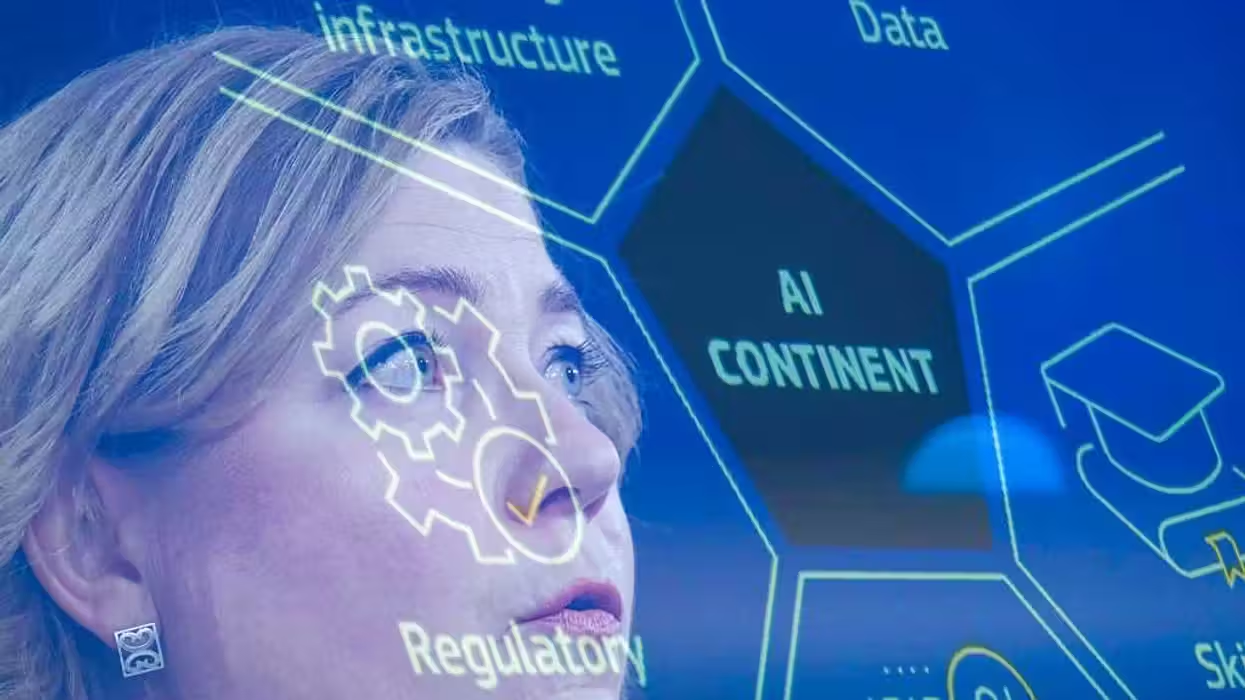
Photo by Martin Bertrand/Getty Images

Our elites' latest scheme is to put anything that exists up for sale.
In a recent appearance with Glenn Beck, Whitney Webb lays out her case that the Great Reset did not end with the election of Donald Trump. Elites, ever given to schemes involving central control, reallocation, and number-go-up, are planning to tokenize everything they possibly can, including natural resources.
Webb draws a connective line between BlackRock CEO Larry Fink, the World Economic Forum (not exactly a freedom-oriented outfit), digital ID, and this process of so-called tokenization. This term is new to many people. Essentially, tokenization refers to the process of placing a metric, a mark, an identifying code on an object. The identifying marker is then pumped into an aggregating and analytical machine.
There is, no doubt, some obscurantism in the tech community, intentional or otherwise, as well as some heavy cognitive dissonance playing out for the rest of us as we watch the real, actual economy withering at our feet. How does giving (or selling) rights to natural resources like water help you and your neighbors pay bills, raise families, live in some semblance of accord with God?
The coming system is intended to solve for the management of not just anything but everything.
Neither Larry Fink nor the WEF are working on our behalf by digitizing water. Then what are they up to? Dropping in recently on CNBC, Fink said, “I do believe we’re just at the beginning of the tokenization of all assets, from real estate to equities to bonds, across the board.”
Through the implementation of natural resource assets, the plan is to mark, meter, and digitize water, trees, air, and animals of every sort, then pin their existence, in the digital tokens' monetized form, to the shared economy. That unlocks foreign investment and, one imagines, perpetuates some modified version of the ever-unstable and unsatisfactory financial enclosure of benefits and retirement that has, so far, kept enough U.S. citizens satiated to keep it rolling.
Any and every AI is designed or able to adapt to the tokenization process. It needs be automatic and fast enough to keep up-to-the-minute record of millions or billions of transactions, sales, shorts, liquidations, and so forth. Rather than a system of streams or channels, the need is for computing to move like water itself. For Bitcoin and other cryptocurrencies hoping to participate in the tokenization bonanza, that means their encryption and storing of information (through so-called hashes and ledgers) needs to flow at the speed of the global digital economy.
Indeed, we’ve seen for years that some lesser-known cryptocurrency companies, like Hashbar as one example, have been building their hash, as it were, to function within an AI-controlled global marketplace. These hash-products, not too dissimilar from Bitcoin in terms of their ledger-keeping properties, are meant, in a stupefying sense, to mark individual drops and tranches of liquid or digitally liquified assets.
RELATED: Can anyone save America from European-style digital ID?

It's hard to visualize such unnatural and invisible arrangements, so here's a real-world example: Say you have 10,000 board feet of Douglas fir trees on a lot in Washington state. If the Fink version of tokenization goes forward, you’ll be able to “digitize” those useful board feet of wood and sell portions, as opposed to the whole lot. Now picture that process for, well, anything you can imagine and much that you can't.
In simple terms, the likely outcome of all of this BlackRock-WEF-AI machination is immediate dissociation between the human and the trees, the fir needles, the smell of the soil. All of that, given enough backroom dealing, political sloth, and diabolical Wall Street ingenuity, will be erased.
Are we talking about selling public lands? Theoretically, yes. Although major legal, regulatory, and political hurdles remain, the principle of leaving at least some portions of the created world exempt from actionable financial valuation is already eroding away. The accelerating logic of digital terraforming has no conceptual limit. Granting the premise that tokenization is good, not only should private property be tokenized, but all water, all minerals, and every possible other item with unexploited value rooted in human experience. The coming AI, digital ID, hash-rated system is intended to solve for the management of not just anything but everything.
The disturbing undercurrent of plans, outcomes, and inertia around this improbable intersection of technologies gets more disturbing when you accept that it is, in fact, a long-term plan nearly realized.
In her chat with Beck, Webb outlines another piece of the puzzle, termed “natural asset corporations.” This is pitched to the mainstream as a way to invest in conservation, ensure biodiversity, and so forth. But if we recall the century-long technocratic play, the current AI inertia, and the bipartisan support for anything to keep the fiat economy limping along, it’s easy to see how those natural assets under ownership might be subject to changes in any legal stipulation barring sales to other corporate or government entities. Those interlocking directorships have a knack for change.
We haven’t even mentioned energy, but we must, because this scheme ultimately needs to take into account the sun itself! Who owns the sun? Well, BlackRock, of course. Or some quasi-tech giant/WEF version of BlackRock.
Actually, no one owns the sun but God, and we have to remember this fact. By way of the wholly God-given system, we see that the sun feeds the grass, grass feeds the animals, we eat the animals.
The technical details on the capture of energy are intense, involving data centers to run the AI, political control to rubber-stamp the terraforming for the electrical inputs, and, at some near point, the encrypting of energetic inputs into a digital (hashing) ledger to be monitored, metered, and controlled.
You can probably see here how necessary the personal digital ID is to the entire panopticon. But if not, consider it unlikely that your or my interests are going to be taken into consideration by third-country customer service agents employed by the electrical company to manage our dissatisfaction in the event that a neighborhood brown-out is required while grid power is shunted over to the local data center.